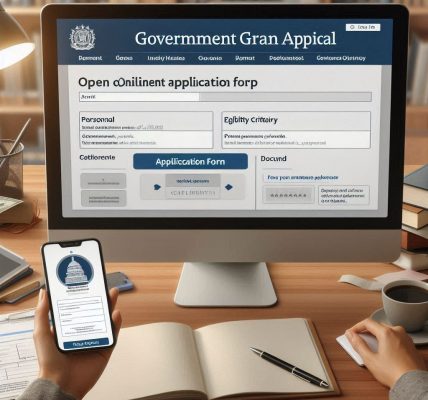Introduction
In today’s globalized world, expanding your business internationally presents an incredible opportunity for growth. For exporters, venturing into foreign markets can lead to increased revenue, brand recognition, and market diversification. However, the process of international expansion can be both complex and expensive. This is where government grants for exporters come in.
Various governments, including India’s, offer grants and subsidies specifically aimed at helping businesses expand internationally. These grants can significantly reduce the financial burden of entering foreign markets and allow businesses to focus on scaling operations, marketing, and logistics. In this blog, we will explore the different types of government grants for exporters, how to access these funds, and how they can help your business expand internationally.
Why Government Grants for Exporters Matter
Government grants for exporters are essential because they provide financial support for businesses looking to tap into international markets. Expanding abroad can be a daunting task, requiring substantial investment in product development, marketing, shipping, and legal compliance with international trade laws. These grants are designed to ease these financial burdens and support the global competitiveness of businesses.
Here’s why government grants for exporters matter:
- Reduce Financial Barriers
Exporting requires substantial capital, from production costs to transportation fees. Government grants can ease the financial strain, enabling businesses to explore international markets without risking their financial stability. - Boost Competitiveness
International expansion can give your business access to larger, more diverse markets. However, without financial support, the initial steps toward exporting may be unaffordable. Grants can give you the necessary financial boost to remain competitive on the global stage. - Increase Market Reach
International trade provides businesses with access to new customers and diverse markets. By securing export grants, businesses can promote their products in regions where demand is growing. - Foster Innovation and Improvement
Some grants are aimed at helping exporters improve their products or services to meet international standards. These grants support innovation, helping businesses improve quality and expand their offerings in foreign markets.
Types of Government Grants for Exporters in India
The Indian government provides several schemes to support exporters in their international ventures. These grants and subsidies aim to help businesses meet the costs associated with exports, including marketing, research, production, and trade missions.
Here are some prominent grants and schemes that Indian exporters can benefit from:
1. Market Access Initiative (MAI) Scheme
The Market Access Initiative (MAI) scheme aims to assist Indian exporters by providing financial support for international marketing activities. The primary goal is to promote Indian products in foreign markets and enhance the competitiveness of Indian exporters.
Key Benefits:
- Financial support for participation in international trade fairs and exhibitions.
- Assistance for conducting market research and promotion activities in foreign markets.
- Funding for developing marketing strategies and materials to attract global buyers.
2. Merchandise Exports from India Scheme (MEIS)
The Merchandise Exports from India Scheme (MEIS) is designed to encourage exports by providing incentives to Indian exporters. Under this scheme, businesses can earn rewards in the form of duty credit scrips that can be used to pay customs duties or other taxes.
Key Benefits:
- Incentives for a wide range of exported goods.
- Duty credit scrips to offset taxes and duties.
- Increased competitiveness for small and medium-sized exporters.
3. Export Credit Guarantee Corporation of India (ECGC)
The Export Credit Guarantee Corporation of India (ECGC) provides export credit insurance services to exporters. The ECGC offers protection against risks such as buyer insolvency, political risks, and other unforeseen circumstances that could impact international trade.
Key Benefits:
- Insurance coverage for export transactions, protecting businesses from non-payment and defaults.
- Support for businesses in managing the risks associated with international exports.
- Helps secure financing for export transactions by mitigating risks.
4. Export Promotion Capital Goods (EPCG) Scheme
The Export Promotion Capital Goods (EPCG) Scheme is designed to help exporters by providing duty exemptions on the import of capital goods. This scheme aims to improve the competitiveness of Indian exporters by reducing the costs associated with importing machinery, equipment, and other tools needed for production.
Key Benefits:
- Exemption from customs duties for the import of capital goods.
- Helps reduce production costs for exporters.
- Enables businesses to modernize and upgrade their manufacturing equipment.
5. Duty Drawback Scheme
The Duty Drawback Scheme is another government initiative that offers exporters a refund on customs duties paid on inputs used in the production of export goods. This scheme reduces the cost burden on exporters and makes their products more competitive in international markets.
Key Benefits:
- Refund on customs duties paid on export goods.
- Boosts the competitiveness of export products by reducing costs.
- Provides a cash flow benefit for exporters.
6. Trade Infrastructure for Export Scheme (TIES)
The Trade Infrastructure for Export Scheme (TIES) supports the creation and modernization of export infrastructure in India. This includes financial assistance for developing or upgrading ports, airports, warehouses, and other trade-related infrastructure.
Key Benefits:
- Funding for building or improving infrastructure essential for export activities.
- Enables businesses to have access to better logistics, reducing operational costs.
- Supports the growth of the export ecosystem in India.
How to Apply for Government Grants for Exporters
Applying for government grants and subsidies for exporters typically involves several steps. Below is a step-by-step guide to help you navigate the application process:
Step 1: Identify the Grant or Scheme
The first step is to identify which grant or subsidy suits your business needs. Research the various available schemes and match them to your business objectives, export targets, and industry. For instance, if you are looking to promote your product in international markets, the MAI Scheme might be the best option.
Step 2: Check Eligibility Criteria
Before applying, ensure that your business meets the eligibility criteria for the specific scheme. Each grant will have requirements such as the size of the business, the type of products being exported, and the business’s export performance.
Step 3: Prepare Documentation
Gather the necessary documents that will be required for the application process. Common documents include:
- Business registration and tax details.
- Financial statements for the last few years.
- Export performance details, such as the volume of exports and destinations.
- Copies of contracts or agreements with foreign buyers.
- Product details, including specifications, certifications, and pricing.
Step 4: Complete the Application Form
Fill out the application form for the respective grant. Ensure that all fields are accurately completed and that you provide clear, concise information about your business and export plans.
Step 5: Submit the Application
Once the application is complete, submit it through the designated platform or department. Most government schemes accept online applications, making the process more convenient.
Step 6: Follow Up
After submission, regularly check the status of your application. If additional information is required, provide it promptly to avoid delays. Some grants may require periodic reporting or updates on how the funds are being used.
Conclusion
Government grants for exporters are an excellent resource for businesses looking to expand internationally. By offering financial support, risk protection, and incentives, these grants help businesses overcome the challenges of entering foreign markets. Whether you’re a small enterprise or a large corporation, securing export grants can significantly enhance your global competitiveness.
By leveraging government schemes such as MEIS, MAI, ECGC, and others, your business can reduce the financial risks associated with exporting and access new markets more effectively. Take the time to research and apply for the grants that are most relevant to your business, and use these funds to fuel your international growth.
With careful planning and the right support, your business can successfully scale and thrive in the global marketplace.




